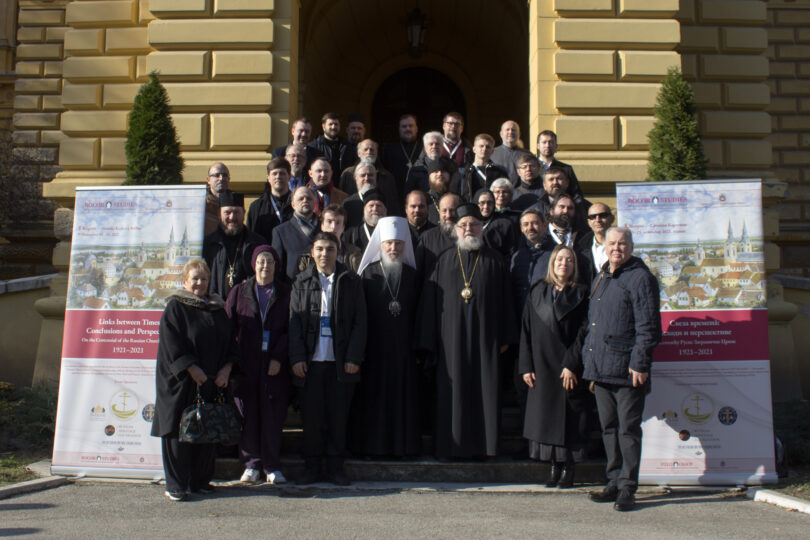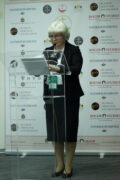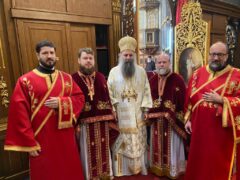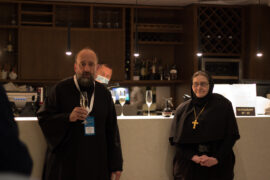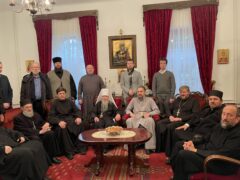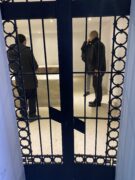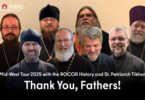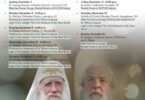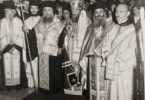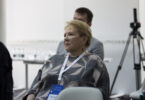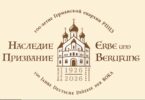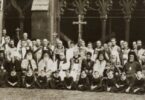The Academic Dimension
In November 1920, General Wrangel’s Russian Army evacuated the Crimea. In its wake went anyone else who wished to leave, including clergymen and bishops. The centennial of this exodus was marked by a series of conferences, two of them in Russia: “The Russian Exodus (Evacuation of the Crimea) One Hundred Years Later: 1920–2020″, at Moscow Theological Academy in Sergiev Posad in October 2020, and “The Russian Exodus: Church Life and the Theological and Philosophical Heritage” in March 2020 at Saint Tikhon’s Orthodox University of the Humanities in Moscow.
The August 1921 Council of Bishops of the Serbian Orthodox Church decided to assist the Russian refugees in organizing a church administration. The Russian Church Abroad was thus granted a canonical foundation. To mark this occasion, an academic conference was held in Belgrade and Sremski Karlovci from November 23–25, 2021. It coincided with the First All-Diaspora Council, held from November 21 to December 3, 1921.
On January 21, 2021, the Synod of Bishops of the Serbian Orthodox Church officially gave its blessing for the conference to be held by the Serbian Orthodox Church Archives, represented by archive director Dr. Radovan Pilipović. My involvement in organizing of the conference in my capacity as director of the Internet site ROCOR Studies was blessed early on by Metropolitan Hilarion, First Hierarch of the Russian Orthodox Church Outside of Russia.
The conference Links between Times: Conclusions and Perspectives was attended by scholars and researchers from the Russian Federation, Belarus, Serbia, Ukraine, the United States, Canada, and Australia. The conference sessions followed the chronology of the history of the ROCOR. Over the three days, 23 talks were presented in Russian and English, covering a wide variety of topics. It was possible to trace the development of one process or another in the history of the Russian Church Abroad. A list of the talks can be found here. The conference benefitted from the assistance of Walker Thompson, a Dr. phil. candidate in Slavic linguistics from Heidelberg University, who provided simultaneous interpretation during the talks and discussions, as well as that of three other translators who had translated papers from Russian to English and English to Russian prior to the event. The conference was also opened up to registered online participants from North America (USA, Canada) and Europe (Germany, Russia, Ukraine, Belarus).
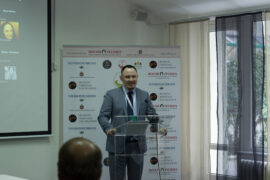
Ivan V. Petrov analyzes relations between the ROCOR and the Orthodox on the German-occupied territories of the USSR
The conference comprised eight thematic sections. Those on the first day took place in the Envoy Hotel conference hall in Belgrade. The first section was about reconstructing the context from which the Russian Orthodox Church Abroad emerged, specifically, autonomous church bodies from the time of the Russian Civil War. The second section discussed the contradictory events of World War II, when some members of the diaspora hoped for a Nazi invasion of the USSR, while tried to help the Orthodox there.
The third section featured a talk on the relationship between the center of the Church in Serbia and the periphery in the Far East, and two talks on the legacy of the Russian-Yugoslav canonist Sergei V. Troitsky. The latter sparked a lively discussion and were important for starting a conversation about Troitsky, a scholar whose canonical thought supported the existence of the Russian Orthodox Church Abroad before World War II yet polemicized with it afterward.
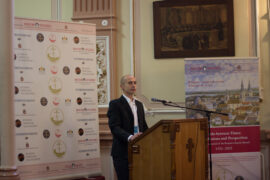
Srechko Petrovich presents about St. Nicolai of Zhicha and Russian emigres
The second day took place in Sremski Karlovci in the building of the St. Arsenije of Sremski Serbian Orthodox Seminary (est. 1794). The fourth and fifth sessions dealt with both the history of Russian clergymen in the USSR and Yugoslavia and the relationship between the Serbian Orthodox Church and the Russian Orthodox Church Outside of Russia.
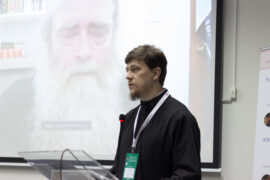
Deacon Paul Siewers presented about the American converts (online) and Deacon Vitaly Permiakov about liturgical developments in the ROCOR
The sixth section, which opened the third day of the conference back in the Envoy Hotel conference hall, covered processes affecting the ROCOR during the Cold War: the relationship between bishops from Russia proper and Belarus, the laity and the episcopate, and support for the underground Church in the USSR. The two presentations in the seventh section dealt with the relationship between the ROCOR and the North American Metropolia (later OCA) from 1920 to the present. The eighth and last section of the conference was devoted to the present and future of the ROCOR. It was a conversation about converts to Orthodoxy in North America, the liturgical tradition of the ROCOR, and what could be done to improve the interaction between the episcopate, clergy, and laity.
The results of the speakers’ research presented in the talks thus provide an impetus for new research and necessary context for understanding the identity of the ROCOR and tie the study of the history of the ROCOR to that of the history of the entire Russian Church.
Church Services and Cultural Program
On the morning of Sunday, November 21, 2021, the day of the Synaxis of the Holy Archangel Michael and All the Bodiless Hosts, a number of conference participants who had come early to Belgrade concelebrated with His Holiness Patriarch Porfirije of Serbia at the patronal feast of the cathedral located opposite the Patriarchate building. After the Divine Liturgy, everybody was invited to a meal, where they observed with interest how down-to-earth and close to his flock Patriarch Porfirije was.
The search for a conference venue in Belgrade had begun in June, 2021. It was not easy to find a hotel with a fully-fledged conference hall. The four-star Envoy Hotel, located near the pedestrian Knez Mihailova St., had a special-purpose compound at 47 Gospodar Evremov St. (a 10-minute walk from the hotel). It was ideally suited for the conference and Hotel Envoy thus “won the bid” to hold it. Unlike in a hotel of the same class in, say, Latvia, the Orthodox hotel staff in Belgrade gave us valuable advice, saving time and money (for example, hotel manager Ana Jovićević on the organization of meals). The Orthodox hotel staff said they were glad to see “men in black” (i.e., clergy) and to listen to the prayers chanted before meals.
By the evening of Monday, November 22, most of the participants had arrived in Belgrade, and I, as the organizer, welcomed everyone to the hotel, noting that research into the history of the Russian Church Abroad had a broad application in helping us understand the processes of global history.
On Tuesday morning, Metropolitan Mark of Berlin and Germany presided at a memorial service for the “founding fathers” of the Russian Orthodox Church Abroad. At Holy Trinity Church, in the Patriarchal Metochion in Belgrade, Vladyka Mark concelebrated with church rector Archpriest Vitalii Tarasiev; Archpriest Gregory Joyce, Secretary of the Chicago and Mid-American Diocese of the Russian Orthodox Church Outside of Russia; and Deacons Andrei Psarev (Holy Trinity Monastery in Jordanville), Sergii Baranov (Chicago and Mid-American Diocese), and Vitalii Permiakov (St. Vladimir’s Orthodox Theological Seminary, OCA). A choir of conference guests and speakers sang under the direction of Reader Andrej Fastovskij from Munich.
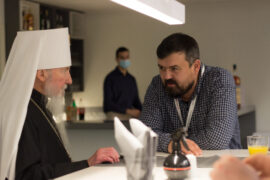
Metropolitan Mark having a conversation during a lunch break with Prof. Danilets from Uzhgorod University
I must say that Metropolitan Mark’s participation enriched the conference. Vladyka Mark did not miss a single talk. His closing remarks aptly summed up each day of the conference. In other words, the academic event was closely connected to the Episcopate of the ROCOR.
The first day of the conference opened with a greeting from His Holiness Patriarch Porfirije of Serbia, who was represented by his vicar, Bishop Justin Jeremić of Hvosno. Then Vladimir Bureha, VIce-Rector of the Kiev Theological Academy, read a greeting from His Beatitude Metropolitan Onuphry of Kiev and All Ukraine. Metropolitan Mark read out a welcome address from His Eminence Metropolitan Hilarion, First Hierarch of the Russian Church Abroad. Archpriest Gregory Joyce then greeted the audience on behalf of his ruling bishop, Archbishop Peter of Chicago and Mid-America. Deacon Andrei Psarev read a greeting from Nicolas Schidlovsky, Dean of Holy Trinity Seminary in Jordanville.
The second day of the conference took the form of a day out to Sremski Karlovci, the home of Metropolitan Anthony (Khrapovitsky) and General Piotr Wrangel. The conference participants were given a tour of the majestic Orthodox cathedral built during the Austro-Hungarian period and of the church sacristy. Next, part of the group visited Metropolitan Anthony’s erstwhile rooms and saw the site of his house chapel. Metropolitan Mark and a group of clergy were received by the diocesan hierarch, Bishop Vasilije. The trip and reception in Sremski Karlovci were made possible through the efforts of the Serbian conference organizer, Dr. Radovan Pilipović, Director of the Serbian Orthodox Church Archives, and by the efforts of seminary dean Archpriest Jovan Milonović. Everyone was deliciously fed. The day in Sremski Karlovci ended with a presentation by Serhiy Shumilo on the work of the International Institute for the Athonite Legacy that he heads. After this, filmmaker Boško Milosavljević screened his documentary His Excellency Baron Wrangel. Notably, one of the conference participants, Alyona Glebovna Kojevnikova (née Berdnikova), recognized her aunt in the story of the Russian colony in Veliki Bečkerek.
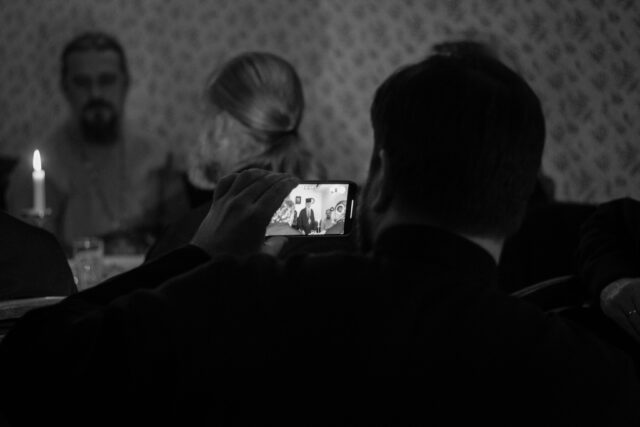 The third day of the conference wrapped up with a reception at Šešir moj, one of the oldest restaurants in the Skardalija district of Belgrade. At it, Metropolitan Mark shared his memories of St. John of Shanghai, passed on to him by those who knew the saint, and of the Monastery of Our Lady of Lesna (Vladyka became Orthodox in the late 1960s). He talked about how Abbess Feodora (Lʹvova) of Lesna had convinced St. John to lie down to sleep as a matter of obedience (he usually rested sitting down). Then I thanked our wonderful team of conference organizers: Walker Thompson, and Srećko and Marijana Petrović. Srečko designed of the conference memorabilia, and his wife Marijana created a wonderful photographic portfolio of the conference. It is impossible not to acknowledge the labors of our hosts, especially Dr. Radovan Pilipović, Director of the Serbian Orthodox Church Archives, for his contributions at all stages and to the organization of the day-long session in Karlovci, and for his warm, heartfelt hospitality and all-round support.
The third day of the conference wrapped up with a reception at Šešir moj, one of the oldest restaurants in the Skardalija district of Belgrade. At it, Metropolitan Mark shared his memories of St. John of Shanghai, passed on to him by those who knew the saint, and of the Monastery of Our Lady of Lesna (Vladyka became Orthodox in the late 1960s). He talked about how Abbess Feodora (Lʹvova) of Lesna had convinced St. John to lie down to sleep as a matter of obedience (he usually rested sitting down). Then I thanked our wonderful team of conference organizers: Walker Thompson, and Srećko and Marijana Petrović. Srečko designed of the conference memorabilia, and his wife Marijana created a wonderful photographic portfolio of the conference. It is impossible not to acknowledge the labors of our hosts, especially Dr. Radovan Pilipović, Director of the Serbian Orthodox Church Archives, for his contributions at all stages and to the organization of the day-long session in Karlovci, and for his warm, heartfelt hospitality and all-round support.
The next morning, on the Feast of St. John Chrysostom, Metropolitan Mark served the Divine Liturgy with Patriarch Porfirije’s blessing at the Convent of the Presentation, which is located in the neighborhood of Senjak. Conference guests and speakers Deacon Vitalii Permiakov, Archpriest Evgenii Legach, Priest Antonii Gerilovich (UOC), and subdeacon Pavel Lisitsyn from London concelebrated with him. The Holy Presentation Convent on Fruška Gora has ties to the Russian sisters from Lesna Convent in Chopovo and the Serbian convent in Kuveždin, the first to be restored after World War I. In his sermon, given in Serbian, Vladyka noted that St. John Chrysostom had not only a golden mouth, but also a golden heart, for the heart is the source of all our thoughts and deeds (cf. Matt. 15:19). Just as we should be inspired by the life of St. John, so we ought also to be inspired by the example of the life of the Holy Theotokos. Shortly after the conclusion of the liturgy, His Holiness Patriarch Porfirije visited the monastery to meet Metropolitan Mark and expressed his regrets that he could not attend the opening of the conference in person.
Some of the conference participants visited Belgrade’s New Cemetery, where a replica of the Iveron Chapel was erected after the original in Moscow was destroyed in 1929. The graves of Metropolitan Anthony (Khrapovitsky) and his cell attended, Archimandrite Feodosii (Melʹnik), are in the crypt there. Priest Nikolaj Kostur (Secretary of the Diocese of New Gračanica and Midwest America of the Serbian Orthodox Church) served a memorial service for the repose of their souls. The conference guests prayed in the chapel and, in spite of heavy rain, toured the necropolis, including the grave of Mikhail V. Rodzyanko (d. 1924), the last “speaker” of the Russian Duma, who was ostracized in the Russian colony in Belgrade for his role in the abdication of Emperor Nicholas II.
Analyzing the Conference
40 people attended the conference in Belgrade. The geographical distribution of the countries from which the presenters and participants came was vast: the Russian Federation (12 people), Ukraine (7 people), USA (6 people), Serbia (5 people), Great Britain, Germany, Slovakia (2 people each), and France (1 person). Most of the presenters were leading experts on the history of the Russian Church Abroad. 10 of them have authored monographs on the subjects of their talks and eight have written numerous articles on them.
Scholars from Australia, Belarus, and Russia delivered long-distance talks. The total number of registered online audience members was over 50. It was especially satisfying that members of the ROCOR diocese in South America, who have not historically been spoilt for attention, participated actively in the conference. In spite of the fact that the conference was held under pandemic conditions that disrupted three people’s plans to attend, it was still possible to bring together “East” and “West” – researchers of the history of the Russian Church from Russia and the Ukraine – which, for obvious reasons, hardly ever happens. Now, the Serbian Orthodox Church Archives will be preparing a collection of talks from the conference for publication. We would also like to publish a thematic proceedings volume in English through a secular academic publishing house.
The conference was made possible through the material efforts of organizations affiliated with the ROCOR[1]The Fund for Assistance to the ROCOR, the Russian Heritage Foundation, the Diocese of Australia and New Zealand, Patriarch Tikhon Russian American Music Institute, the Pastoral School of the Diocese … Continue reading and of individual donors. Their response is further evidence that people are in need of such intellectual events.
Results of Anonymous Participant Surveys; Further Plans
| Survey question (both groups) | Russian group (20participants) | English group (5 participants) |
| Were your expectations met? | Yes: 90% | Yes: 100% |
| Assessment of the academic relevance of the conference (on a 10-point scale) | 9/10 or 10/10 (14 responses)
8/10 (3) 7/10 (2) 6/10 (1) |
9/10 (1 response)
9/10 (2) 8/10 (1) |
| What did the conference give you? | New connections, learning about history, experience, participation in church life | |
| What were the conference’s shortcomings | The main points noted by both groups: a) lack of organizational assistance (e.g., with tours, technical issues); b) lack of time for discussion of talks. | |
| Should more such conferences be held going forward? | Yes: 90% | Yes: 80% |
| Should the next conference take place in Belgrade? | Yes: 60% | Yes: 60% |
Thus, referring to the results of the survey, it can be said that Dr. Radovan Pilipović’s words to the effect that Belgrade is destined to become the capital for the study of the ROCOR’s history are all the more relevant.
References
| ↵1 | The Fund for Assistance to the ROCOR, the Russian Heritage Foundation, the Diocese of Australia and New Zealand, Patriarch Tikhon Russian American Music Institute, the Pastoral School of the Diocese of Chicago and Mid-America, Russian St. Vladimir Church in Miami, Otrada American-Russian Aid Association, and the Orthodox Benevolent Fund. |
|---|

